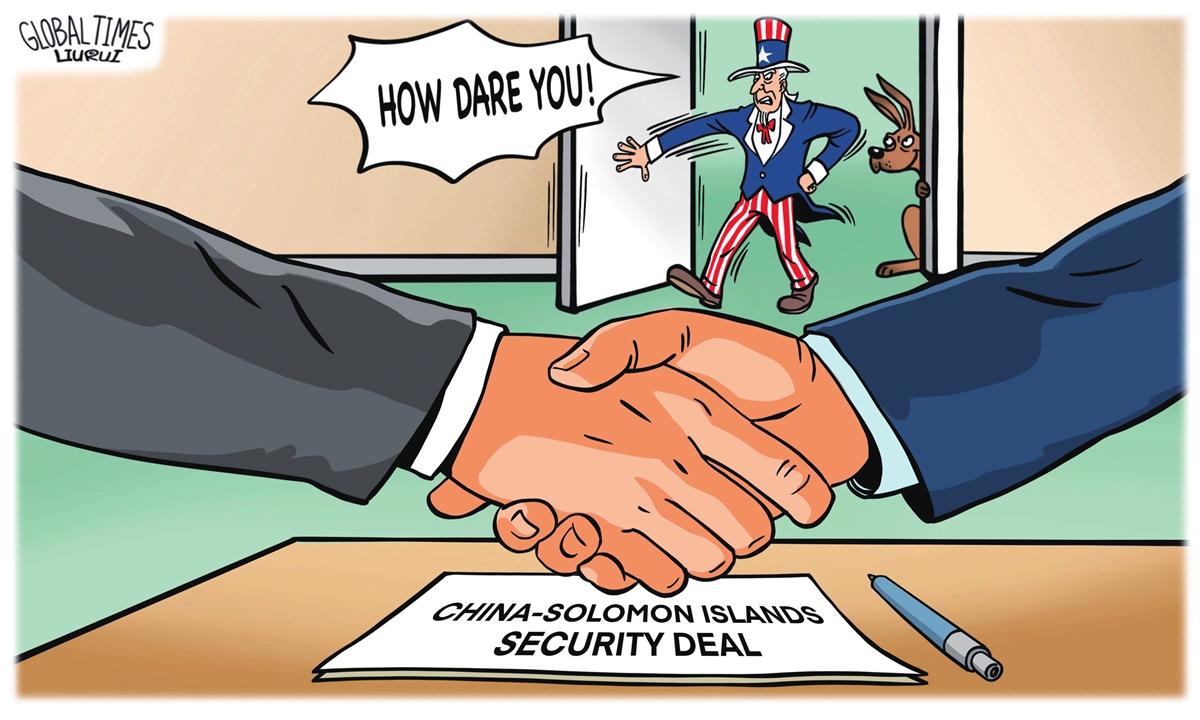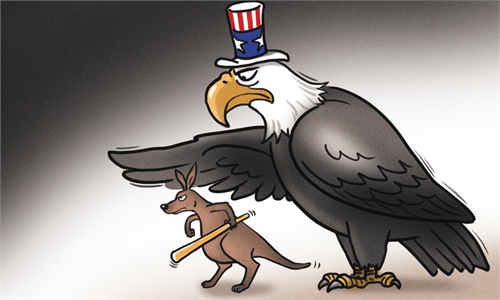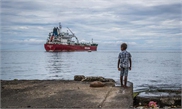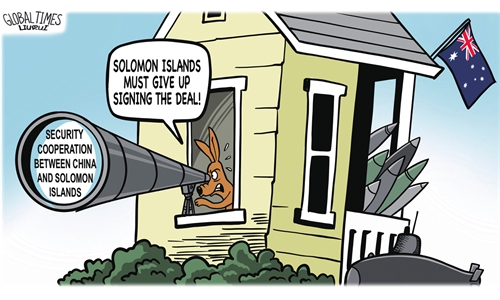Facing Australia’s condescending attitude, Pacific island countries start to say no

Illustration: Liu Rui/GT
After waves of accusations and complaints from Australia about the security agreement between China and the Solomon Islands, Manasseh Sogavare, the Solomon Islands Prime Minister, hit back at Canberra's hypocrisy and hysteria. It is increasingly clear that Australian politicians need to stop their paranoid finger pointing.
Australia has kept saying that Solomon Islands' security deal with China will threaten Australian security, lacks transparency and even publicly asked the Solomon Islands to cancel the deal.
On Friday, Sogavare fought back, telling the country's parliament: "One would expect that as a member of the Pacific family, Solomon Islands and members of the Pacific should have been consulted to ensure the AUKUS treaty is transparent since it will affect the Pacific family by allowing nuclear submarines in Pacific waters…"
But Australian Prime Minister Scott Morrison blindsided him with the announcement of the AUKUS treaty. "I learnt of the AUKUS treaty in the media," Sogavare said, adding, when Australia signed AUKUS, "We did not become theatrical or hysterical."
Apparently, the world has seen through the hypocrisy and double standards of Australia. What he has unveiled is the fact that Australia never sees Pacific Island countries as equals, and Canberra does not consult them on anything, including on issues that might threaten the peace and security of the region.
Both Australia and the Pacific island countries are signatories to the South Pacific Nuclear Free Zone (SPNFZ) Treaty, known as the Treaty of Rarotonga, which opposes nuclear proliferation and commits to disarmament by preventing the placement of nuclear weapons in the South Pacific.
But, Australia took the lead in undermining the treaty through joining AUKUS, without consulting other Pacific island nations, Xu Shanpin, an adjunct research fellow at China University of Mining and Technology, told Global Times.
Canberra's colonist mentality has been put into full display. First, it cast a blind eye to many Pacific island countries' concerns over the US and Australia's move to bring nuclear submarines to the South Pacific, mudding the waters of the region. Second, it attempted to force its own will on regional countries, blatantly interfering in their domestic affairs.
The US and Australia keep screaming about a possible Chinese military base on the Solomon Islands, but the fact is there will be no military base. China has clarified many times that the agreement with the Solomon Islands is not about establishing a military base, but on security cooperation, which is normal exchange and cooperation between two sovereign and independent countries.
Why are Canberra and Washington so scared? Perhaps one of the reasons for their "theatrical" and "hysterical" response is the fear of more Pacific island countries waking up to the US' and Australia's hegemonic and colonist behavior and may seek alternatives to their condescending behavior.
Pacific island countries have always had a strong sense of autonomy, according to Xu. Unfortunately, the US and Australia failed to respect it.
It is also worth noting the differences between China-Solomon Island security deal and AUKUS. The deal with China was mainly initiated due to the violent riots on the island last year. The agreement is aimed at promoting social stability and long-term peace and security in Solomon Islands, as well as protecting Chinese people's lives and property there. "It targets anti-China rioters to defend China's overseas interests," Xu noted.
AUKUS, on the other hand, is another story. It sets a damaging precedent of taking advantage of the loophole in the Treaty on the Non-Proliferation of Nuclear Weapons, with a goal to secure the maritime hegemony held by the three countries, and with obvious geopolitical calculations, Xu said.
As Chinese Foreign Ministry spokesperson Wang Wenbin put it, the AUKUS deal is neither open nor transparent. When will the US and Australia invite South Pacific island countries and other regional countries to review the AUKUS security deal?



